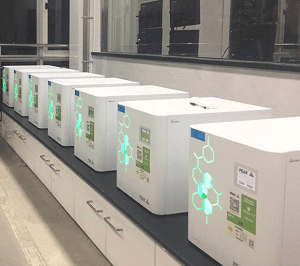Use Precision Hydrogen Generators as a Centralized Gas Supply Solution
Learn how to use your Peak Precision Hydrogen generator as centralized gas solution.
Overview
As laboratories are increasingly under pressure to streamline their operations, a reliable, consistent, stable, and safe supply of gases for applications such as gas chromatography (GC) or mass spectrometry (MS) has never been more important. Nowadays, round the clock sample analysis is commonplace, so laboratory managers need to consider how to ensure that instrument uptime is maintained. Common gas supplies include high pressure cylinders, dewars and gas generators. With a centralized supply, gas is delivered to the laboratory via pipework allowing delivery to each instrument via a regulator and flow controller allowing adjusted pressure and flow.
For hydrogen, a centralized cylinder supply is not recommended because of the risk of leaks in the pipework which can go undetected and are a potential cause of fires or explosions. Hydrogen generators are the preferred method of hydrogen delivery in the laboratory since they are a far safer source of hydrogen compared with cylinders. For applications such as GC, which commonly uses H2 to supply detectors, and increasingly for carrier gas, a generator offers consistent gas quality as well as a number of safety features.
On start-up, Peak’s Precision Hydrogen generators carry out a comprehensive self-test to ensure that there are no internal leaks. If the hydrogen generator detects a leak on start-up, an alarm will alert the user that there is a problem and any hydrogen will be vented from the system, with the cell being switched off. The unit also has fault detection, forced air ventilation to prevent accumulation of H2 or O2 within the generator, real-time monitoring of gas pressure to prevent over and under pressure. Additionally, the generator has an auto shut-off feature to stop hydrogen production in the event of an external leak. As part of the CSA certification tests, the generator was shown to present no risk of explosion in the event that all internal hydrogen leaked and fans were not operational.
The volume of gas supplied by a single Hydrogen generator is limited, however, and for some industries, such as petrochemical and CRO labs, there may be dozens of GC’s in the laboratory so a large number of Hydrogen generators are needed to meet gas demand. Peak Scientific’s Precision Hydrogen generators use a sophisticated software control system that enables a tandem gas supply from the hydrogen generators that allows multiple generators to be connected in series. The advanced on-board electronic systems allow multiple generators to communicate with each other, ensuring continuous hydrogen concentration, eliminating the risk of downtime and increasing the safety and reliability of hydrogen gas.
Advantages to using Peak’s Precision Hydrogen generator as a centralized gas supply solution
1. When you are running multiple Hydrogen generators and one requires maintenance, it does not affect the overall gas supply and your GC’s can still work.
2. All devices are controlled by a single ‘Master’ unit, which controls flow and pressure of all linked generators, which means you don’t have to configure each generator separately.
3. The Precision Series Master unit allows change of settings via the HMI screen, with all auxiliary units controlled by this generator.
4. If the Master fails or shuts down, the next generator automatically assumes control of all generators in series.
5. If there are one or more auxiliary machines experiencing downtime, it will not affect other generators. The remaining equipment can continue to work properly.
6. Planned maintenance can be carried out without completely disrupting H2 supply to the lab, reducing downtime, and saving money.

Figure 1. Customer site seven Peak hydrogen generators provide gas supply to more than 60 GCs
Make the switch to a generator today and contact us.
If you liked this article, you may enjoy these:
What is so Precise About the Precision Series?
Tips and Tricks for Gas Chromatography
Alternative Carrier Gas For GC and GC-MS